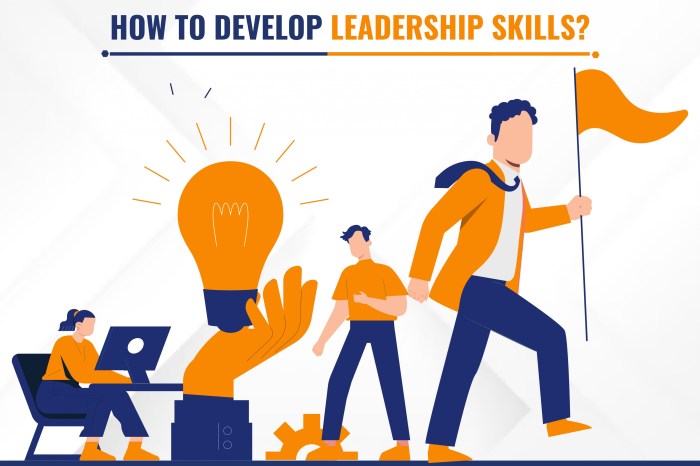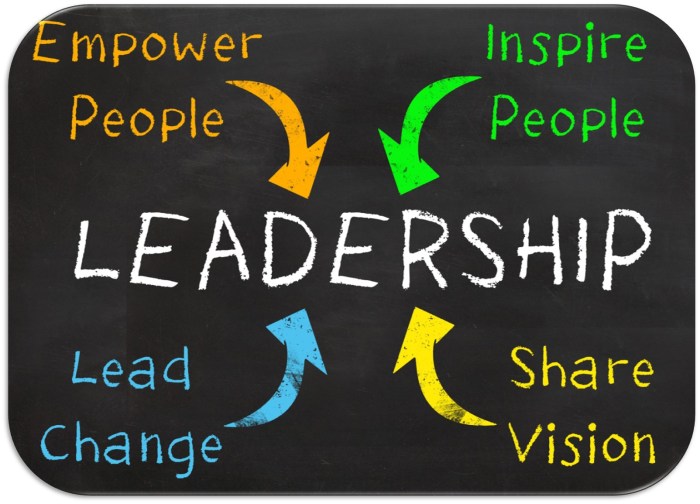Leadership Development is all about nurturing the next generation of strong leaders who will drive organizations to success. From identifying key strategies to overcoming challenges, this topic dives deep into the world of effective leadership.
Importance of Leadership Development
Leadership development is like the secret sauce in an organization’s recipe for success. It’s all about grooming the next generation of leaders, building strong teams, and driving innovation.
Examples of Successful Companies
- Apple: Known for its innovative products, Apple invests heavily in leadership development to ensure a strong pipeline of future leaders.
- Google: With its focus on employee empowerment and creativity, Google places a high value on developing strong leaders at all levels of the organization.
- Amazon: Jeff Bezos’ leadership principles have shaped Amazon’s success, emphasizing the importance of continuous learning and growth.
Investing in Long-Term Success
Investing in leadership development is like planting seeds for a bountiful harvest in the future. Companies that prioritize developing their leaders see higher employee engagement, improved performance, and better overall business results. It’s a long-term strategy that pays off in dividends.
Strategies for Effective Leadership Development
Effective leadership development requires a combination of key strategies that focus on building strong leadership skills, fostering mentorship relationships, and emphasizing the importance of feedback and self-assessment.
Key Strategies for Developing Strong Leadership Skills
- Provide opportunities for leadership training and workshops to enhance skills such as communication, decision-making, and problem-solving.
- Encourage hands-on experience through leadership roles in school clubs, sports teams, or community projects.
- Cultivate emotional intelligence by promoting self-awareness, empathy, and effective relationship building.
- Foster a culture of continuous learning and growth mindset to adapt to changing environments and challenges.
Role of Mentorship in Leadership Development Programs
Mentorship plays a crucial role in leadership development by providing guidance, support, and valuable insights from experienced leaders. Mentors can offer advice, share experiences, and help mentees navigate their leadership journey. Through mentorship, aspiring leaders can gain valuable knowledge, skills, and perspectives that contribute to their personal and professional growth.
Importance of Feedback and Self-Assessment in Leadership Growth
Feedback and self-assessment are essential components of leadership development as they provide valuable insights into strengths, weaknesses, and areas for improvement. Constructive feedback from peers, mentors, and supervisors helps leaders identify blind spots, enhance performance, and refine their leadership style. Self-assessment allows leaders to reflect on their actions, behaviors, and decisions, leading to continuous growth and development in their leadership abilities.
Leadership Development Programs
Leadership development programs are essential for nurturing and enhancing the leadership skills of individuals within an organization. These programs come in various forms and cater to different levels of leadership.
Types of Leadership Development Programs
- Executive Leadership Programs: Designed for senior-level executives to sharpen their strategic thinking and decision-making skills.
- Supervisory Leadership Training: Focuses on developing leadership skills for first-line supervisors and managers.
- Mentorship Programs: Pairing experienced leaders with emerging leaders to provide guidance and support.
- Cross-Functional Training: Exposing leaders to different departments and functions within the organization to broaden their perspective.
Successful Leadership Development Initiatives
- Google’s “Googlegeist” program focuses on fostering leadership skills and innovation among its employees, leading to a positive impact on employee engagement and company success.
- The U.S. Military’s leadership development programs have been credited with producing some of the world’s most effective and resilient leaders.
- General Electric’s Leadership Development Program (LDP) has been instrumental in grooming future leaders and ensuring a steady pipeline of talent within the company.
Impact on Employee Retention and Motivation
- Leadership development programs have been shown to increase employee retention rates by providing opportunities for growth and advancement within the organization.
- Employees who participate in leadership development initiatives are often more motivated and engaged in their work, leading to higher productivity and job satisfaction.
- Effective leadership development programs can create a culture of continuous learning and improvement, which can have a positive impact on overall employee morale and performance.
Characteristics of Effective Leaders

Effective leaders possess a unique set of characteristics that set them apart from the rest. These qualities not only help them lead effectively but also inspire others to follow their lead.
Emotional Intelligence in Leadership
Emotional intelligence is a key trait of successful leaders. Leaders with high emotional intelligence can understand and manage their own emotions, as well as the emotions of those around them. This allows them to navigate challenging situations with empathy and make decisions that benefit the team as a whole.
- Self-awareness: Successful leaders are in tune with their own emotions and how they affect their behavior.
- Empathy: They can understand and relate to the feelings of others, fostering strong relationships within the team.
- Conflict resolution: Leaders with emotional intelligence can navigate conflicts effectively by considering the emotions of all parties involved.
Adaptability and Resilience in Leadership Roles
Adaptability and resilience are crucial characteristics for leaders, especially in today’s fast-paced and ever-changing business environment. Leaders who can adapt to new challenges and bounce back from setbacks are better equipped to lead their teams to success.
- Flexibility: Effective leaders are open to change and can adjust their strategies when needed.
- Resilience: They can bounce back from failures and setbacks, learning from them and moving forward with a positive attitude.
- Risk-taking: Leaders who are adaptable and resilient are more willing to take calculated risks, leading to innovation and growth.
Challenges in Leadership Development

When organizations implement leadership development programs, they often face various challenges that can hinder the effectiveness of such initiatives. Overcoming resistance to these programs and adapting to rapid technological advancements are crucial for successful leadership development strategies.
Common Challenges in Leadership Development Programs
- Lack of buy-in from top management and key stakeholders.
- Difficulty in identifying and nurturing future leaders within the organization.
- Inadequate resources allocated for leadership development initiatives.
- Resistance to change and traditional leadership styles.
Overcoming Resistance to Leadership Development Initiatives
- Communicate the benefits of leadership development clearly to all stakeholders.
- Provide ongoing support and coaching to individuals participating in the programs.
- Align leadership development goals with the overall strategic objectives of the organization.
- Create a culture that values continuous learning and personal growth.
Impact of Rapid Technological Advancements on Leadership Development
- Rapid technological advancements require leaders to adapt quickly to new tools and ways of working.
- Leaders must develop digital literacy and the ability to leverage technology for effective communication and decision-making.
- Technology can enable virtual leadership development programs, offering flexibility and accessibility to a wider audience.
- Organizations need to invest in upskilling leaders to navigate the digital landscape and lead remote teams effectively.
